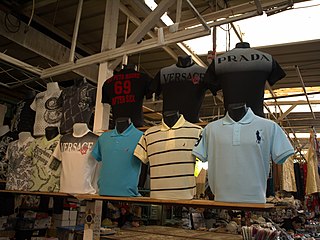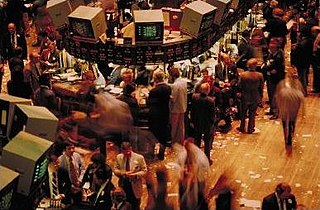Related Research Articles
E-commerce is the activity of electronically buying or selling of products on online services or over the Internet. E-commerce draws on technologies such as mobile commerce, electronic funds transfer, supply chain management, Internet marketing, online transaction processing, electronic data interchange (EDI), inventory management systems, and automated data collection systems. E-commerce is in turn driven by the technological advances of the semiconductor industry, and is the largest sector of the electronics industry.

An auction is usually a process of buying and selling goods or services by offering them up for bids, taking bids, and then selling the item to the highest bidder or buying the item from the lowest bidder. Some exceptions to this definition exist and are described in the section about different types. The branch of economic theory dealing with auction types and participants' behavior in auctions is called auction theory.

eBay Inc. is an American multinational e-commerce corporation based in San Jose, California, that facilitates consumer-to-consumer and business-to-consumer sales through its website. eBay was founded by Pierre Omidyar in 1995, and became a notable success story of the dot-com bubble. eBay is a multibillion-dollar business with operations in about 32 countries, as of 2019. The company manages the eBay website, an online auction and shopping website in which people and businesses buy and sell a wide variety of goods and services worldwide. The website is free to use for buyers, but sellers are charged fees for listing items after a limited number of free listings, and an additional or separate fee when those items are sold.

To counterfeit means to imitate something authentic, with the intent to steal, destroy, or replace the original, for use in illegal transactions, or otherwise to deceive individuals into believing that the fake is of equal or greater value than the real thing. Counterfeit products are fakes or unauthorized replicas of the real product. Counterfeit products are often produced with the intent to take advantage of the superior value of the imitated product. The word counterfeit frequently describes both the forgeries of currency and documents as well as the imitations of items such as clothing, handbags, shoes, pharmaceuticals, automobile parts, unapproved aircraft parts, watches, electronics and electronic parts, software, works of art, toys, and movies.

The Chicago Mercantile Exchange (CME) is a global derivatives marketplace based in Chicago and located at 20 S. Wacker Drive. The CME was founded in 1898 as the Chicago Butter and Egg Board, an agricultural commodities exchange. Originally, the exchange was a non-profit organization. The Merc demutualized in November 2000, went public in December 2002, and merged with the Chicago Board of Trade in July 2007 to become a designated contract market of the CME Group Inc., which operates both markets. The chairman and chief executive officer of CME Group is Terrence A. Duffy, Bryan Durkin is president. On August 18, 2008, shareholders approved a merger with the New York Mercantile Exchange (NYMEX) and COMEX. CME, CBOT, NYMEX, and COMEX are now markets owned by CME Group. After the merger, the value of the CME quadrupled in a two-year span, with a market cap of over $25 billion.

A Dutch auction is one of several similar types of auctions for buying or selling goods. Most commonly, it means an auction in which the auctioneer begins with a high asking price in the case of selling, and lowers it until some participant accepts the price, or it reaches a predetermined reserve price. This type of price auction is most commonly used for goods that are required to be sold quickly such as flowers, fresh produce, or tobacco. A Dutch auction has also been called a clock auction or open-outcry descending-price auction. This type of auction shows the advantage of speed since a sale never requires more than one bid. It is strategically similar to a first-price sealed-bid auction.
Business method patents are a class of patents which disclose and claim new methods of doing business. This includes new types of e-commerce, insurance, banking and tax compliance etc. Business method patents are a relatively new species of patent and there have been several reviews investigating the appropriateness of patenting business methods. Nonetheless, they have become important assets for both independent inventors and major corporations.
In international law and business, patent trolling or patent hoarding is a categorical or pejorative term applied to a person or company that attempts to enforce patent rights against accused infringers far beyond the patent's actual value or contribution to the prior art, often through hardball legal tactics. Patent trolls often do not manufacture products or supply services based upon the patents in question. However, some entities which do not practice their asserted patent may not be considered "patent trolls" when they license their patented technologies on reasonable terms in advance.

Open outcry is a method of communication between professionals on a stock exchange or futures exchange, typically on a trading floor. It involves shouting and the use of hand signals to transfer information primarily about buy and sell orders. The part of the trading floor where this takes place is called a pit.

1-Click, also called one-click or one-click buying, is the technique of allowing customers to make purchases with the payment information needed to complete the purchase having been entered by the user previously. More particularly, it allows an online shopper using an Internet marketplace to purchase an item without having to use shopping cart software. Instead of manually inputting billing and shipping information for a purchase, a user can use one-click buying to use a predefined address and credit card number to purchase one or more items. Since the expiration of Amazon's patent, there has been an advent of checkout experience platforms, such as OurPass, PeachPay, Fast, Bolt, and Zplit which are democratizing similar one-click checkout flows.
This is a list of legal terms relating to patents. A patent is not a right to practice or use the invention, but a territorial right to exclude others from commercially exploiting the invention, granted to an inventor or his successor in rights in exchange to a public disclosure of the invention.
eBay Inc. v. MercExchange, L.L.C., 547 U.S. 388 (2006), is a case in which the Supreme Court of the United States unanimously determined that an injunction should not be automatically issued based on a finding of patent infringement, but also that an injunction should not be denied simply on the basis that the plaintiff does not practice the patented invention. Instead, a federal court must still weigh what the Court described as the four-factor test traditionally used to determine if an injunction should issue.
MercExchange is a technology development and on-line auction company. Their founder's name is Thomas G. Woolston.
SAP Ariba is an American software and information technology services company located in Palo Alto, California. It was acquired by German software maker SAP SE for $4.3 billion in 2012.
Evergreening is any of various legal, business, and technological strategies by which producers extend the lifetime of their patents that are about to expire in order to retain revenues from them. Often the practice includes taking out new patents, or by buying out or frustrating competitors, for longer periods of time than would normally be permissible under the law. Robin Feldman, a law professor at UC Hastings and a leading researcher in intellectual property and patents, defines evergreening as "artificially extending the life of a patent or other exclusivity by obtaining additional protections to extend the monopoly period."
In the United States, a valid patent provides its proprietor with the right to exclude others from practicing the invention claimed in that patent. A person who practices that invention without the permission of the patent holder infringes that patent.
eBay has experienced controversy, including cases of fraud, its policy requiring sellers to use PayPal, and concerns over forgeries and intellectual property violations in auction items.
Consumer to consumer (C2C) markets provide a way to allow customers to interact with each other. Traditional markets require business to customer relationships, in which a customer goes to the business in order to purchase a product or service. In customer to customer markets, the business facilitates an environment where customers can sell goods or services to each other. Other types of markets include business to business (B2B) and business to customer (B2C).
The smartphone wars or smartphone patents licensing and litigation refers to commercial struggles among smartphone manufacturers including Sony Mobile, Google, Apple Inc., Samsung, Microsoft, Nokia, Motorola, Huawei, LG Electronics, ZTE and HTC, by patent litigation and other means. The conflict is part of the wider "patent wars" between technology and software corporations. The patent wars occurred because a finished smartphone might involve hundreds of thousands of patents.
Pakistan's e-trading mainly involves buying and selling goods and services using internet or telephone, through the use of electronic means such as computer, fax machine, cellular phone, automated teller machines (ATM) and other electronic appliances with or without using inter-net. Online banking, e-ticketing for air travelling, share trading in stock exchange are few examples of e-commerce of modern advancement. With its potential, e-trading can reduce the cost per transaction, increase efficiency, support contest, lower prices and boost international demand. It can open new areas for business in the service sector like on-line education, medical services, consultancy, and data exchange. It can also provide expansion in trade through domestic and international market research, advertising and marketing. In the financial services area, it can make easy and speedy transactions and transfer of money at a minimum risk. The interesting feature of online trading is that an investor simply sitting in his office or home can buy or sell through the Internet via mobile/tablet or PC and before being an experienced trader he may learn a lot by watching market screens or web portals at his convenience.
References
- ↑ BARISIC, SONJA (June 12, 2007). "eBay in Patent Fight Over 'Buy It Now'". Associated Press.
A small Virginia company in a patent fight with eBay Inc. asked a federal judge Tuesday to stop the online auction powerhouse from using its "Buy It Now" feature allowing shoppers to buy items at a fixed price
- ↑ https://www.supremecourt.gov/opinions/05pdf/05-130.pdf [ bare URL PDF ]